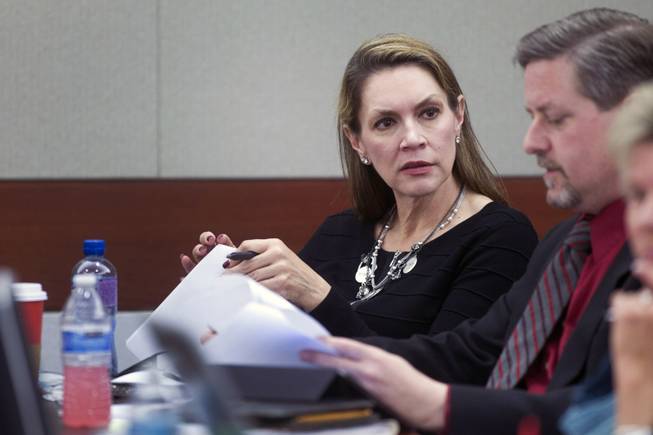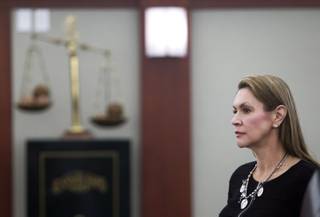
Attorney Elizabeth Quillin confers with attorney Brian Rutledge during DUI Court at the Clark County Regional Justice Center Wednesday, Feb. 12, 2014. STEVE MARCUS
Sunday, March 23, 2014 | 2 a.m.
This story was first published in the March 23 issue of The Sunday.
Elizabeth Quillin, a successful attorney who had worked for Las Vegas City Hall, Clark County and the state Attorney General’s Office, stood in front of a judge, humiliated as her crime was bared for all to see. She would never have admitted it, did her best to hide it, but her crashed Lexus couldn’t be denied: She was a drunk. Her booking mug was plastered in newspaper and TV news reports, and angry readers called for her to be punished to the hilt.
Shamed, she quit her job as the Henderson city attorney.
That was three years ago.
Today she is back at work. And she is bringing a virtue to the courtroom few other attorneys can, or wouldn’t dare admit they could: empathy, and a spirit of redemption. She is a defense attorney representing clients in Clark County’s specialty DUI court.
Conversations between attorneys and their clients are privileged; the ones between Quillin and her clients may be privileged in a different sort of way.
“It’s really nice to be able to share on a real personal level with the clients,” Quillin said. But don’t think for a moment she’s all soft-and-warm.
“I let ’em have it,” Quillin said. “I just kind of feel like with one misdemeanor — for me that was enough. The horror of having to live with what could have happened. Would’ve, could’ve, should’ve. That was enough.”
Quillin tells her clients they either jump into recovery with both feet — which she did and remains sober today — or endure the consequences.
•••
Henderson Police gave this report in connection with the arrest of Quillin on May 23, 2011:
Quillin drove her Lexus RX400 off the road and across landscaping before striking a fire hydrant, a boulder and a tree.
A witness approached the Lexus but told police Quillin reversed her vehicle, backed away from a tree and drove forward, nearly striking her. Quillin then continued driving but sideswiped the witness’ parked vehicle and a raised curb before striking another tree.
She failed a field-sobriety test, and her blood-alcohol level was 0.28, more than three times the legal limit.
Quillin pleaded no contest to driving under the influence, was fined $585 and ordered to attend a DUI class and a victim impact panel.
•••
Quillin had enjoyed a smart, rising career in Clark County, launched as a prosecutor for the city of Las Vegas, then as a public defender before being hired as chief deputy attorney general, running the Attorney General’s Southern Nevada Office. From there she became an assistant Clark County manager before shifting to Henderson City Hall.
Over the years, Quillin had her share of cases involving clients with substance abuse issues.
And it was that world to which she returned after completing her rehab following her own DUI arrest. After taking six months off, she started her private practice in 2012, which she maintains today. As part of her work, she contracts with the county to provide defense counsel in the adult drug court; her duties were later expanded to include the specialty DUI and veterans courts. Each is designed to focus more on recovery than punishment, to be helpful more than damning.
She brings with her not just her courtroom experience as a former public defender and prosecutor, but her own painful past. A client is told to wear an ankle monitoring bracelet? Yes, she knows they can chafe. Have to listen to victims of drunk drivers share their anguish? Yep, that’ll tear you apart. Rehab? Been there. Recovery? Yes, she knows that’s the hard part.
Still, Quillin doesn’t amplify the importance of her presence in the courtroom. “There are so many people who are trying to help the folks. I’m just one little teeny, tiny person doing my tiny little bit of it,” Quillin said. “Some of these people who are (working in the specialty courts) have been doing it for years. I’m kind of a Johnny-come-lately.”
• • •
The majority of the legal issues Quillin handles involve someone who has relapsed, hasn’t gone to classes or has picked up new charges that might get him or her kicked out of the program.
Mostly, her clients seek support. And that’s when she shares her own story.
After her DUI, Quillin had read everything she could about addiction. There was so much she didn’t know.
Only a few years before, Quillin had been a self-described teetotaler. Then came the drink that started it all — a Christmas gift remembered months later, a nice Pinot Grigio. The last time she’d been intoxicated was in 1991 in Paris.
In 2006, Quillin underwent gastric bypass surgery, which researchers have linked to a risk of alcohol abuse. In 2007, she was overwhelmed by empty-nest blues after sending her son off to college. Then came years of medical scares. Quillin’s mother was diagnosed with Stage 3 breast cancer. Just as her mother was finishing grueling treatment, Quillin’s brother was diagnosed with melanoma. Both lived, but feelings of isolation and depression set in for Quillin. She started drinking.
She knew something was wrong because when she drank, she couldn’t stop.
“How the hell does this happen?” she asked herself. “How on earth do you go zero to 60?”
She went to her surgeon. His advice: Cut back and you’ll be fine.
But she couldn’t cut back.
She was terrified someone would find out her secret, so she enrolled in a 12-step recovery program.
She didn’t realize at the time, but her secret struggle was one being quietly shared by other lawyers and similar professionals in high-stress jobs: either engaging in addictive behavior or not being fully informed about the land mines of addiction.
In July, David Schubert, a former Clark County deputy district attorney who pleaded guilty in 2011 to possessing cocaine, was found dead in his home. The coroner ruled his death a suicide brought on by an overdose of allergy pills, sedatives and anti-depressants.
Louis Schneider, Schubert’s lawyer and friend, said that Schubert’s death was a tragedy, the end result of a mistake that cost him so much.
“Dave was severely punished and stripped of his bar license,” Schneider said. “What he really needed was help.”
In the past few years, there have been some efforts to expand the information and resources about substance abuse available to lawyers.
In February 2013, Nevada lawyers were required to take at least one continuing education course every three years on substance abuse, addictive disorders or mental health issues.
The Nevada Bar also created the Nevada Lawyer Assistance Program, a more formal way of connecting lawyers to clinical services. Referrals can be voluntary or mandatory.
For the program, the bar contracted with Dr. Peter Mansky, who runs the Nevada Professional Assistance Program, which helps people such as physicians, attorneys and dentists battle addiction.
“When you are very bright and very intelligent, there is a sense of, ‘I can do anything,’” Mansky said, noting lawyers tend to fear their careers will be over if someone finds out they are getting help.
“That’s such an irony because if they don’t get treatment, their career could be over,” Mansky said.
After the news broke about her DUI, Quillin was surprised how many people reached out to her. Some people she would have never expected told her they’d gone through similar experiences.
It’s too easy to list attorneys who have died over the past few years because of substance abuse related issues, Quillin said.
“I think (my DUI) happened for a reason and not having the anonymity has also given me a freedom. You certainly can’t hide,” Quillin said.
Hardly a week goes by without somebody calling to share a story of addiction, she said.
“I’m humbled by that,” Quillin said. “I’m humbled that someone would want to share that with me.”
Leading by example is something she tries to empower her clients to do also.
She reminds them that if they can meet the requirements and graduate from the court’s DUI program, it won’t just improve their lives, it will be something everyone in the court will see: Somebody made it.
“If she’s an example of someone who has been able to turn her life around, live a sober life and contribute to hopefully changing the behavior of those who come into that court,” said Sandy Heverly, co-founder and executive director of Stop DUI, “then that’s a good thing.”


Join the Discussion:
Check this out for a full explanation of our conversion to the LiveFyre commenting system and instructions on how to sign up for an account.
Full comments policy